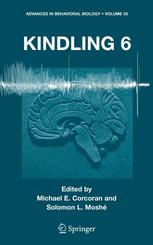

Most ebook files are in PDF format, so you can easily read them using various software such as Foxit Reader or directly on the Google Chrome browser.
Some ebook files are released by publishers in other formats such as .awz, .mobi, .epub, .fb2, etc. You may need to install specific software to read these formats on mobile/PC, such as Calibre.
Please read the tutorial at this link: https://ebookbell.com/faq
We offer FREE conversion to the popular formats you request; however, this may take some time. Therefore, right after payment, please email us, and we will try to provide the service as quickly as possible.
For some exceptional file formats or broken links (if any), please refrain from opening any disputes. Instead, email us first, and we will try to assist within a maximum of 6 hours.
EbookBell Team

4.3
88 reviewsKindling is the dominant animal model of epilepsy and the processes underlying the development of epilepsy. Studies of kindling have led to important insights into the mechanisms of epilepsy and potential treatments for seizures and seizure development. These proceedings of the Sixth International Conference on Kindling, held on June 2004 in Victoria, British Columbia, report the results of cutting-edge research on kindling and closely related phenomena. A broad array of themes concerned with research on epilepsy and kindling is covered in the book:
Pathogenesis of kindling, including developmental patterns; electrophysiology; anatomy, morphology, and neural circuitry; genes, species, and strains; synaptic pharmacology and neurochemistry
Behavioral consequences of kindling
Drugs and interventions against kindling
Clinical relevance of kindling for our understanding of epilepsy in patients
About the Editors:
Michael Corcoran is a Professor in the Department of Anatomy and Cell Biology at the College of Medicine at University of Saskatchewan, Saskatchewan, Canada. Solomon L. Moshe is Professor and Vice Chairman of Neurology, Albert Einstein College of Medicine, Bronx, New York.